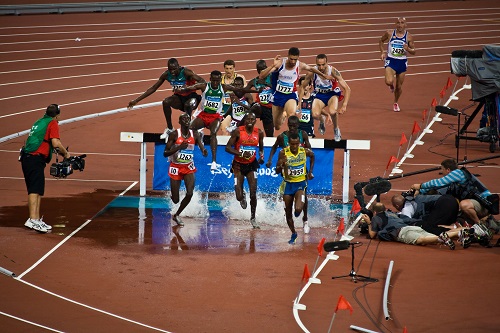

When threats to boycott the 2022 Winter Olympics in Beijing were first tossed around, athletes cringed. It might have been more than four decades since the U.S. led the global charge to opt out of the 1980 Summer Games in Moscow to protest the Soviet invasion of Afghanistan (a decision so unpopular to this day that former President Jimmy Carter refuses to discuss it in interviews) – but the ill will is very much alive and well.
Now, there’s a movement afoot for a “diplomatic boycott” to protest allegations of China committing genocide and other human rights violations against its Uyghur and other Turkic Muslim minority groups. But what, exactly, is a diplomatic boycott? What message does it send? Can it help?
Let’s start at the beginning. A diplomatic boycott of the Olympics is, well, kind of a boycott-lite: All the disapproval and none of the guilt. Basically, says Bloomberg, a diplomatic boycott wouldn’t ban U.S. athletes from attending the Games, but would prohibit funding to send any elected leaders or other officials there. (Those who wanted to attend would have to pony up their own funds – and would likely risk some epically bad P.R. in the 24-hour news cycle).
If it comes to pass, the diplomatic boycott will come as a tremendous relief to athletes, many of whom were unable to train, much less compete, during COVID, and whose competitive careers just restarted. (The presence of U.S. dignitaries is far less of a concern to athletes, after all).
Two of the early champions of the diplomatic boycott were Utah Senator Mitt Romney and Virginia Senator Tim Kaine, who raised the possibility back in the summer.
“It’s disgusting that the IOC has provided Beijing a platform to host the world, and to have a nation which is committing genocide against a people is at the same time hosting an Olympic Games is jarring and outrageous,” Romney said, adding that he wanted to make a statement about the China and human rights without punishing U.S. athletes. “They have trained their entire lives to be ready for this moment,” he added.
It’s the kind of thing athletes in 1980 would have liked to have heard. In total, 60 nations (led by the U.S.) stood down from attending the Games in Moscow, according to The History Channel. Some countries did not forbid athletes from competing as individuals under the Olympic flag, but American athletes were told that if they attempted to compete, they faced losing their passports and being stranded in Moscow. A group of American athletes sued the U.S. Olympic Committee to participate but lost their case. The boycott resulted in just 80 countries competing in the Olympics, the fewest since 1956.
The upshot of the boycott? Well, aside from tens of thousands of athletes being denied their chances to compete in the Games, and many having their athletic careers abruptly ended, nothing changed in the world. The Soviet-Afghan War raged on for two more Olympic cycles, finally ending in 1989. And, with the U.S. and other powerhouses out of contention, the Soviets won 195 medals, an Olympic record that still stands today. (Ouch).
It was not exactly a shining moment for the U.S. and the athletes today who suffered because of the boycott are still bitter; in fact, the boycott remains one of the most bitterly disagreed with decisions of any presidential administration and is generally described as a futile and meaningless gesture that hurt nobody except for the athletes.
The History Channel notes, “Carter enlisted boxing star Muhammad Ali to campaign across Africa to recruit countries to join the boycott. However, Ali reversed course while on the tour, facing criticism for being a White House puppet.”
It's unlikely a diplomatic boycott, which is, after all, simply a censorious gesture, would have changed anything in 1980 but it would have allowed athletes to compete. And 40 years later, the same thing can be said of the Games in Beijing.
And as a side note, Beijing did not exactly, in the long view, have a spotless record the last time it hosted (2008). Britannica.com notes, “In the months prior to the Games’ start… international focus on China’s pollution problems, and protests over China’s human rights record and Tibet became part of the Olympic story. Moreover, the Chinese government was criticized for its failure to ensure complete media freedom for visiting reporters in the lead-up to the Games.”
In decades past, the IOC might have skimmed over a bid from a company that had political issues; however, with fewer cities willing to host the modern Games, it can’t afford to be as choosy.
Other alternatives to a diplomatic boycott, according to the Council on Foreign Relations (CFR), are relocating the Games to another site, athlete protests (either by opting out of attending, or by attending but protesting on location), and actions by sponsors to withdraw their financial support.
CFR notes, “China’s foreign ministry has warned of a “robust response” to any boycotts, and experts point out that Beijing has many ways it could retaliate. The Chinese government could suspend bilateral exchanges and participation in global talks, such as those on climate change; disrupt trade; and sanction foreign officials. Indeed, there are countless examples in recent years of Beijing retaliating against foreign actions it disapproved of.
China could also leverage its vast consumer market of 1.4 billion people to damage companies that withdraw support for the games. For example, earlier this year, brands including H&M and Nike faced boycotts by some of the Chinese public after the companies said they would stop using cotton from Xinjiang. “If Beijing perceives that it has lost face, it could react pretty strongly,” says CFR’s Yanzhong Huang.”
The Olympic Games have the goal of helping to build a better, more peaceful world through sports by showing not just great victories but good sportsmanship, and by uniting the world to watch the spectacle and drama each Games provides. Unfortunately, in the past 125 years, the Games have been marked by geopolitical drama, resulting in cancellations, bans and boycotts. In fact, boycotts alone have happened six times although the U.S. participated in only one of these.
Those who do not learn from history are destined to repeat it, and it may be that the one and only positive thing to come out of the disastrous decision on the 1980 Games was its bitter legacy, something that even 40 years on, officials are likely to avoid revisiting.

